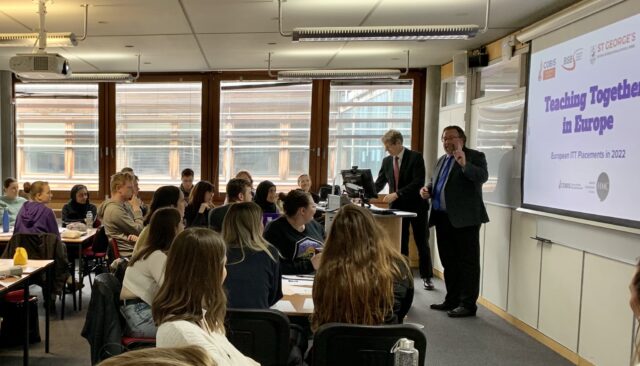Blog
Government, Luck, and the Recruitment Crisis

Tony Emmerson
Senior Deputy Head, The English College in Prague
Read the blog
In March, the government launched a new inquiry into teacher recruitment, training, and retention, at which point many sceptics will have recalled the words of P.J. O’Rourke:
“A little government and a little luck are necessary in life, but only a fool trusts either of them.”
Are we at risk of being so foolish?
The government’s own figures show it reached only 59% of the target for trainee teachers in the year 2022/23, down from 79% in 2021/22. The graph plotting recruitment figures, flat for years, bumped up with Covid but is now heading south. The omens for the coming year are not good: By May 2022, 1519 candidates had been accepted for the coming year in England; in May 2023 the number was 1102.
We need to heed P.J.’s advice: any school leader that relies on luck or government to fix this unfolding mess is gambling with the future of their school, whichever part of the schools’ sector they are in. They are also gambling with the intellectual future of the United Kingdom. Whether HMC, GSA, fee-paying or state maintained, every school needs to be doing what it can to support the sustainability of teaching in the twenty-first century.
My personal contribution to this was the creation of Teaching Together in Europe (TTE): a partnership between three European HMC schools (ECP, St George’s Rome and the British School of Brussels) offering European-based placements to trainees from PLSCITT and Nottinghamshire Torch SCITT. My vision was to give the trainees experience of different systems and ways of thinking, so they can more flexibly adapt to yet-unknown challenges, while at the same time allowing participating providers to offer a prestigious enhancement to their course. If they came out of the experience slightly more in touch with their European identity, that was a bonus!
We are also working with One Cumbria to find opportunities for their early career teachers, and colleagues in their schools, that inject an international element to their programmes. Even just having discussions about school matters, both strategic and pedagogical, with colleagues in different environments can be eye-opening.
“Why does it have to be like this?”
Still my favourite all-purpose question, and one that needs to be asked more often.
TTE is no fishing expedition – we emphasise that the best way to prepare for international teaching is to hone your skills in the UK – but I acknowledge that giving PGCE students a taste of an HMC school, in the UK or internationally, could be seen as encouraging teachers to leave state-maintained schools. Perhaps so, if you underestimate the dedication of many young teachers to support the system that they themselves benefitted from, or were hoping that they’d never notice that the fee-paying sector exists. Surely we are less tempting, if not painted as forbidden fruit?
TTE is just one idea, that suited the circumstances of my school. Each and every school can offer something different, whether it is placements, expertise, or supporting local providers in recruitment. If there isn’t an existing scheme to implement your ideas, create one! If you have no ideas, have some! Now is not the time to fear the blank page.
Working to train new teachers is also a boost for the schools involved. Becoming a mentor, whether formally qualified or not, can be a rewarding career development, especially for dedicated classroom teachers who want to be doing something of whole-school significance other than climbing the greasy pole of leadership. And let’s face it, such teachers are the engine of our schools. There are not enough big chairs for us all to have one.
The very presence of trainees in the common room injects a dose of energy and idealism. We all have those days, when paperwork is high and energy is low, where we wonder if this is where we want to be. Trainees hold a mirror up to the teachers we are now, and dare us to like what we see. And, like all people who don’t yet know what they can’t do, some of their ideas are terrible but some are brilliant, bringing refreshing perspectives.
The very essence of teaching is passing the torch of knowledge from one generation to the next. Are we at risk of falling into darkness, as we wait for others to rekindle the light? Added together, the collective expertise within our schools spans centuries and continents. Surely we back ourselves over both luck, and the government? If your school is not doing anything to support trainees into the profession, one way or another, consider this a call to arms.
Most of us take it for granted that when we run an advert in the TES we’ll get a pool of credible candidates. But that pool is running dry. That is our collective problem. And, rather than wait for higher powers to fix it, we all need to heed P.J. and be part of the collective solution.

Tony Emmerson is the Senior Deputy Head at The English College in Prague